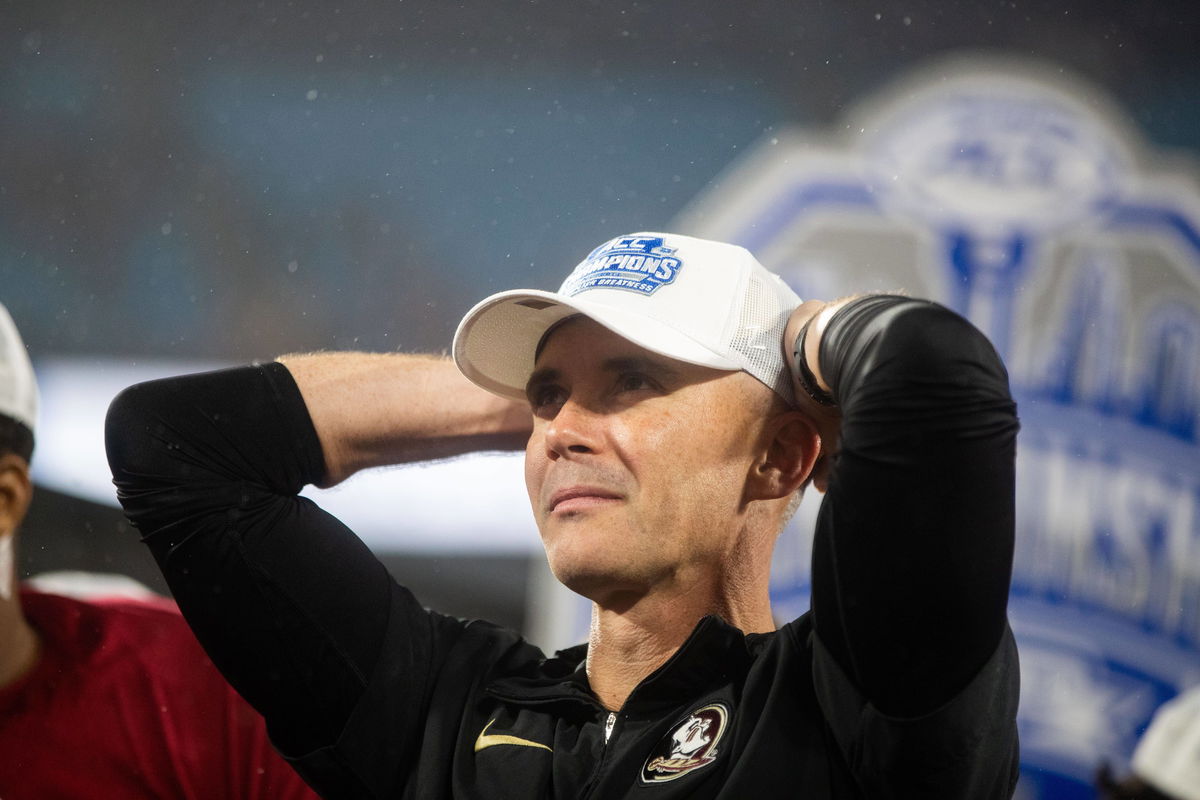
Imago
Syndication: Treasure Coast Florida State Seminoles head coach Mike Norvell takes a second to soak in the moment. The Florida State Seminoles defeated the Louisville Cardinals 16-6 to claim the ACC Championship title in Charlotte, North Carolina on Saturday, Dec. 2, 2023. , EDITORIAL USE ONLY PUBLICATIONxINxGERxSUIxAUTxONLY Copyright: xAliciaxDevine/TallahasseexDemocratx USATSI_22038999

Imago
Syndication: Treasure Coast Florida State Seminoles head coach Mike Norvell takes a second to soak in the moment. The Florida State Seminoles defeated the Louisville Cardinals 16-6 to claim the ACC Championship title in Charlotte, North Carolina on Saturday, Dec. 2, 2023. , EDITORIAL USE ONLY PUBLICATIONxINxGERxSUIxAUTxONLY Copyright: xAliciaxDevine/TallahasseexDemocratx USATSI_22038999
Revenue sharing is changing college football for good. But many programs are reacting to it in ways that are catching some attention. Tennessee, for example, has a law protecting the university if there is an NIL fallout. FSU is using other methods, and its rev-share contract is under fire for being a little too harsh. “They’re throwing everything they can and the kitchen sink,” one NIL agent said. Can Mike Norvell’s program withstand these allegations as it enters this new era?
Watch What’s Trending Now!
“[There] is a problem with a contract when it is so unfair, one-sided, and oppressive that it shocks the conscience,” an adjunct law professor told The Guardian. In a report from CBS Sports, the NIL guidelines stand as such that FSU football has the leverage over NIL deals with players. The part that is catching the most fire is about injuries and illnesses and their effects on the agreement. Per the contract, “The following circumstances create a breach of contract by Student-Athlete: Student-Athlete experiences any illness or injury which is serious enough to affect the value of the rights granted to [school] under this Agreement.”
Basically, it allows Mike Norvell’s program to renegotiate or even cancel the NIL contract of a player if he suffers a serious injury. The reason why FSU is being criticized is that injuries are bound to happen; they’re not entirely avoidable. They are probably the most predictable things when it comes to college football. But the primary issue here is the loss of leverage. FSU’s rev-share rule really just hangs the player out to dry. Oppressive and aggressive are the two biggest attributes being assigned to this rule. And that’s not all. FSU also has the right to extend contracts without renegotiation. Furthermore, the program will impose a maximum fine of $2500 on players if they lose team equipment, even if it’s the first time.
ADVERTISEMENT
How ‘oppressive’ FSU revenue-sharing deals show continued exploitation of college football players l The Guardian https://t.co/2Z9DARDEJL
— fuseboxradio (@fuseboxradio) July 13, 2025
“Each individual situation will be unique, and the hypotheticals are impossible to predict,” FSU had in its rebuttal statement to CBS Sports. In the era of the House Settlement, it is the players who will have the leverage when it comes to NIL deals. At FSU, this will be the exact opposite. “I do understand they have all the leverage, but f—k,” an anonymous Big 12 GM told CBS Sports. Almost nobody is in tune with FSU football’s stance on this particular aspect. Urban Meyer is warning potential recruits to be wary of this if they’re considering Mike Norvell and Co. for their collegiate career.
ADVERTISEMENT
Urban Meyer calls time of death on Mike Norvell’s FSU
This new contract of FSU had Urban Meyer dish out a grim opinion on the program. “If this goes through, the days of Florida State are numbered,” he said in a July 2 episode of The Triple Option. “If this is final, recruiting is over,” he added. The House statement gives football players an exit door to use at their whim when they receive better offers. There is no limit on where the NIL funds come from for the athletes. To Urban Meyer, it looked like this was FSU’s way of enabling itself to have the final say. “I wouldn’t sign this contract because I’m giving away all my leverage,” Mark Ingram II added, echoing Meyer’s sentiments.
Florida State currently sits at the 14 position in the 2026 recruiting class. It’s been an up-and-down journey for Mike Norvell at FSU, losing some elite targets and winning some. But with these new clauses in play, there are chances that they’ll impede the Seminoles’ pace in recruiting. And Norvell is already moving at a staggering pace. FSU is in talks with some great players, but cannot hold onto them in the end.
ADVERTISEMENT
It’s hard to say how FSU looks to flourish in college football and in this new rev-share era with these rather harsh contracts. The extent of injuries can be unpredictable, but they are a given when it comes to college football. Can FSU expect current players to stay and future recruits to still consider the program for their careers?
Top Stories
Patrick Mahomes’ Dad Faces 10-Year Prison Sentence After Chiefs QB’s Father Reportedly Violated Probation Terms

Prayers Pour In From Jordan Love & Co. as Cowboys Star Mourns Tragic Personal Loss

Justin Jefferson Makes Final Decision on Joining Buffalo Bills After Further Damaging J.J. McCarthy Relationship

Matthew Stafford Makes Final Decision on Retirement After Narrowly Beating Drake Maye For NFL MVP

Multiple PGA Tour Pros Stopped from Playing as WM Phoenix Open Round Is Canceled Over Recurring Problem

PGA Tour Split Into Two as Scottie Scheffler Confirms Stance on Patrick Reed’s Return

ADVERTISEMENT
ADVERTISEMENT
ADVERTISEMENT
.png)
.png)
.png)



